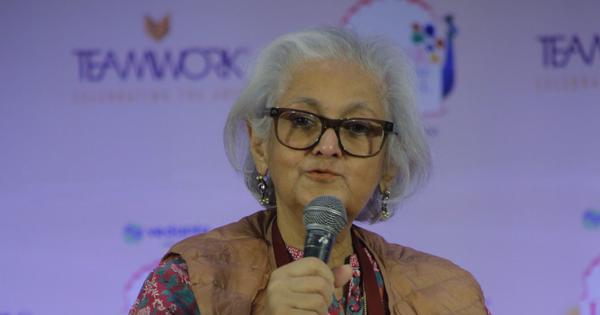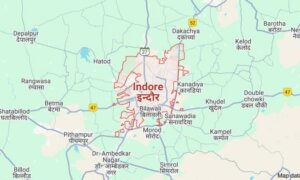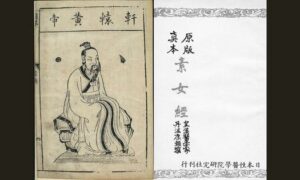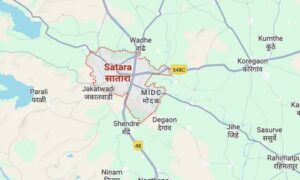
“The hidden harmony of a housewife’s tale is structured, day after day, by simply carrying on.”
The Delhi via Bombay crew reunites in Namita Gokhale’s Priya, the 2013 sequel to her debut novel Paro (1984). With Paro gone – Priya Kaushal’s frenemy through thick and thin – the turbulent drama of Priya’s youth has morphed into a matronly anxiety for her twins Luv and Kush, and demanding spousal duties towards her husband Suresh. No longer a slaving lawyer, Suresh has risen through the ranks to become the Minister of State for Food Processing, Animal Husbandry, Fisheries and Canneries. A minor portfolio but important nevertheless.
Priya enjoys the VIP treatment – a sprawling bungalow in Delhi’s poshest neighbourhood, a host of servants, and citizens who fawn over her. Priya reiterates that she’s just a “housewife” and a dutiful companion to her husband – still the girl from a one BHK Bombay flat who somehow managed to end up on Delhi’s Dara Shikoh Marg. An upgrade so significant that her elder brother now addresses her as “didi”, based simply on her enviable social status.
After Paro
And still, Paro looms large in her heart. Priya remembers her as though one would a lover (or a sworn enemy), and admits that Paro’s absence has made her small and unambitious. She drifts along with Delhi’s currents – her sons live abroad and Suresh is too important a man to be bogged down by memories of the past. “Paro – sexy, beautiful, destructive. All that I am not, then and now. Me – I’m just an ordinary housewife,” declares Priya. Her days are occupied by silly social events, beauty maintenance, and hobnobbing with Delhi socialites, none of whom she likes. In Paro’s absence, Priya finds herself unchallenged and bored – no one she knows is an adequate match to Paro’s temper and brilliance. A void that will never be filled.
Priya is finally spurred into action when both of her sons land in India. Desperate to see them “settled”, she begins the arduous process of finding them the right brides from the right families whom her son can come around to loving. Things get interesting when Lenin (Paro’s former lover and Priya’s friend) turns up as an activist campaigning for Binayak Sen’s release from jail.
As luck would have it, Luv falls in love with Lenin’s daughter Paromita, a journalist, whom Priya also takes to immediately. This union is favourable and unexpected, and Priya is only too glad to take Lenin into the folds of her family. However, Kush turns out to be a more complicated project – he shows little interest in a marriage proposal from a business magnate’s daughter and is generally unkeen on the matters of women.
While her foreign-return sons’ attitudes appal her, she tries to keep her wits about her and tries her best to accommodate their individualities, even taking Luv’s lip piercing in stride and reasoning with herself when she finds a pack of condoms in Kush’s bag. This was new India, here, children are their own people, and not the extensions of their parents.
Despite all comforts, life in Delhi is far from perfect, especially if there are women like Pooonam hovering over you and hankering for your attention. “Nylon” to Paro’s “silk”, Pooonam is a socialite and businessman Manoviraj Sethia’s mistress. Shrill and tactless, Pooonam latches on to Priya in a false sense of friendship. A cheap copy of Paro, Pooonam spells doom as Priya suspects Suresh is canoodling with her behind her back. But Priya isn’t entirely blameless either – BR has a cameo appearance and there’s a tempestuous night at the Taj Mahal Hotel in Bombay. The extramarital tango continues.
In her fifties, nearly menopausal, and an almost VVIP, Priya is a phenomenon that could only have been possible in new “Indyaa” – an India where numerology is hard science, sati and socialites coexist, men are punished for their religious identity, and where women will always be second-class citizens. Suresh’s self-importance and Kush’s political ambitions are a jarring contrast to Lenin’s good-hearted fight against the wrongful incarceration of activists. Pooonam is boxed by her lover but she hides her bruises behind Bulgari sunglasses. Lenin’s wife, Geeta Devi, is a rising politician playing the long game while Priya’s political presence is limited to unknowingly ending up at an event organised by fringe groups championing the cause of sati. Every fortune is fleeting and no ideology is permanent, and Priya, wealthy and important as she is, still considers herself a “victim of social vertigo”. This is, after all, “new India, half dream, half nightmare.”
Paro forever
Sober and recovering from the addictive Paro, Priya displays surprising maturity and restraint when she’s on her own. As Priya prepares for her role as the Kaushal matriarch, we see how duties and age can set people right, even allowing them to forgive and forget. With cattiness and drama at a minimum (I missed it!), Gokhale chooses Priya to be an unexpected portrait of a nation in flux. With everyone having moved on and up in life, the retrospective lens offers a flummoxing yet true view into an entire generation of Indians, who, not too long ago, were still at the crossroads of modernity and dehumanising “traditions”. With her classic tongue-in-cheek humour, Gokhale, in a way, recapitulates the dizzying decades between the two novels – the rise of po-co feminism, revival of honour killing and sati, the romantic promises of communism and Maoism, and how all of it changed in the post-liberalisation era.
And yet, the more things change, the more they remain the same. Priya’s story reinforces the importance of social mobility, while Pooonam is a reminder that even the most well-off women are mistreated behind the doors. These hypocrisies of the great Indyaan culture are not to be taken lightly, for they conceal every mean illness of our great nation – that of caste, class, faith, and sex.
It is unlikely there will be another Paro–Priya story. But it is not so easy to break a cosmic connection. Paro returns to Priya, if only in name, as her sweet and affectionate daughter-in-law, Paromita.
Paro–Priya forever. The saga continues…
Also read: Namita Gokhale’s 1984 debut novel, ‘Paro’, is sassy, sexy, and savage
Priya: In Incredible Indyaa, Namita Gokhale, Penguin India.
📰 Crime Today News is proudly sponsored by DRYFRUIT & CO – A Brand by eFabby Global LLC
Design & Developed by Yes Mom Hosting






